 Today, Project Change is treated to a chance to learn about Social Styles and how we each have a way or working with others that is quite distinct. Former Lockheed Martin Executive will introduce a new way of looking at our particular ways of interacting. Are we amiable or analytic? Are we driven or Driven? John has worked with our international programs for almost 20 years, where he was the mainstay Myers Briggs expert. We look forward today to another enlightening workshop.
Today, Project Change is treated to a chance to learn about Social Styles and how we each have a way or working with others that is quite distinct. Former Lockheed Martin Executive will introduce a new way of looking at our particular ways of interacting. Are we amiable or analytic? Are we driven or Driven? John has worked with our international programs for almost 20 years, where he was the mainstay Myers Briggs expert. We look forward today to another enlightening workshop.
Social Styles- What is your Style of working with people
Training this Friday-How Versatile Are You?
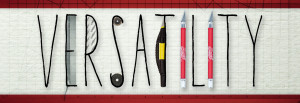
The Social Styles Profile has four quadrants that test whether you lean towards a personal style of Asking or Telling, and spread across sectors named Amiable, Driven, Analytical, and Expres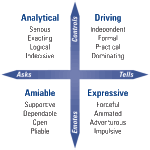 sive. But there is more. Another critical self learning tool focuses on VERSATILITY – the ability to meet what Harvard Professor Ron Heifetz calls Adaptive Challenges. Versatility, they say, is the best predictor of success and the key to interpersonal effectiveness.
sive. But there is more. Another critical self learning tool focuses on VERSATILITY – the ability to meet what Harvard Professor Ron Heifetz calls Adaptive Challenges. Versatility, they say, is the best predictor of success and the key to interpersonal effectiveness.
The Team this Friday will fill in some forms that will reveal how they score on the Versatility Scale. When you work with someone, you have your own style, your own preferred way of working. If you are going to be successful, your team have to change and adapt to how you get things done. But that is only half the story. You have to adapt and change to how they perceive you. It is like a dance, and the moves that go with different kinds of music. If all you can do is waltz when the music suggests a tango, then you are literally out of step.
The Project Change team have already come up with work challenges and they are learning to adapt, learning to adjust their expectations and renegotiate some of their roles. We are looking forward to sharing some of those experiences as our expert John Dold takes us through the workshop this Friday.
Making an Impact we can Measure
 AmeriCorps has a few short snappy sayings that sum up the spirit of the work. One is “Getting Things Done” which says that the Project Change Team are all about ACTION, rolling up their sleeves and getting stuck in. Another that probably is used less but is just as important is that Project Change is about making an impact that we can measure. Too often, the NGO business relies on the presumption that, if ones actions are good, you must be doing good. However, that is not enough. Unless we can measure it, and use the feedback to learn how we can do even better, we are actually working blind.
AmeriCorps has a few short snappy sayings that sum up the spirit of the work. One is “Getting Things Done” which says that the Project Change Team are all about ACTION, rolling up their sleeves and getting stuck in. Another that probably is used less but is just as important is that Project Change is about making an impact that we can measure. Too often, the NGO business relies on the presumption that, if ones actions are good, you must be doing good. However, that is not enough. Unless we can measure it, and use the feedback to learn how we can do even better, we are actually working blind.
All this is to provide the context of today’s important meeting with Doctor Gila Shusterman who is our professional research scientist who guides Project Change in the process of measuring impact. The outcome that we have pledged to deliver is about academic engagement-(ED27) showing that because of our work, students K-12 in our school and after school programs are doing better at school. They have a more positive attitude towards school and are relating in positive ways to their teachers and peers and everyone else involved in their education.
Doctor Gila will be providing her expert training for the team after lunch on November 6th 2015 to prepare the team to deliver their Pre- Test to their students. Then she returns in the afternoon on March 11th 2016 to help us get ready for the Post Test of the young people we are working with.
We look forward to an exciting year where we are eager to prove that we are making a difference.
Supervisors Training This Friday
 This Friday, Project Change hosts the Supervisors of our 7 Partner Sites to come and share their experiences and learn more about AmeriCorps and the importance of the role that they play. Since many of them are graduates of Project Change itself, the meeting is also a sort of Alumni gathering too. We will share best practices and explore ways that the Supervisor Team can be the team that stands behind the Team.
This Friday, Project Change hosts the Supervisors of our 7 Partner Sites to come and share their experiences and learn more about AmeriCorps and the importance of the role that they play. Since many of them are graduates of Project Change itself, the meeting is also a sort of Alumni gathering too. We will share best practices and explore ways that the Supervisor Team can be the team that stands behind the Team.
Peer Coaching Helping AmeriCorps to GROW
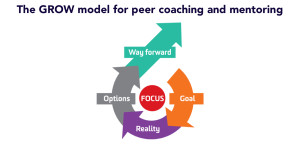
Last Friday, the team were treated to a special training from Lynne Feingold, master coach and one of the leaders of the peer to peer coaching network in the Federal Government. Lynne took the group through a series of exercises that began with centering and focusing on your breathing. It is a simple and yet fundamental skill that prepares one to be a Listener. We come to our meetings so distracted at times, that we aren’t even listening to ourselves, let alone ready to give attention to someone else.
Next Lynn demonstrated the power of the Question- how a problem or an issue has a context, or arises from a situation, and that if we are going to be helpful to one another, we need to ask the sort of open ended questions that draw out the salient details. Questions such as Why only invite interpretation, taking us into the mind of the member, rather into the situation that the member finds themselves. The goal of the first set of questions is to see what you see, hear what you see, feel what you feel. Its a basic of storytelling, to transport us there, give us your experience so we can walk around inside it and perhaps offer you a different or fresh perspective.
Stay tuned for the next excerpt about this special Project Change process.
Getting Ready for Guest Faculty- Peer-to-Peer Group Coaching
Project Change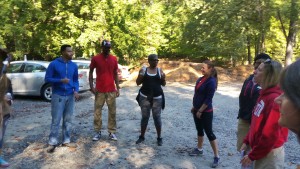 got off to a great start, with four Friday meetings during the month of September to get everyone into the AmeriCorps groove. The highlight was our trip to Camp Letts, on a beautiful day where the team braved the dreaded zip wire in the morning and lazily canoed the river in the afternoon, and concluded with a camp fire and stories. Thanks to our guides Meredith and Richelle and a big shout out to the Supervisors and staff from our partner sites who joined us in a fun day.
got off to a great start, with four Friday meetings during the month of September to get everyone into the AmeriCorps groove. The highlight was our trip to Camp Letts, on a beautiful day where the team braved the dreaded zip wire in the morning and lazily canoed the river in the afternoon, and concluded with a camp fire and stories. Thanks to our guides Meredith and Richelle and a big shout out to the Supervisors and staff from our partner sites who joined us in a fun day.
October is a special month of guest trainings which begin on October 9th with M aster Coach Lynne Feingold introducing the formal practice of Peer to Peer Group Coaching. The team have already started this activitity with the Bells and Whistles check-in time that starts every meeting. If a member has a challenge and they want more feedback, they request time from the group to have a conversation. During that time, the group acts as a coaching team, and asks questions to unfold the situation, then deeper questions to expose the assumptions behind the dilemma, and then to help the person come up with a positive plan of action that they are willing to hold themselves accountable for at the next meeting.
aster Coach Lynne Feingold introducing the formal practice of Peer to Peer Group Coaching. The team have already started this activitity with the Bells and Whistles check-in time that starts every meeting. If a member has a challenge and they want more feedback, they request time from the group to have a conversation. During that time, the group acts as a coaching team, and asks questions to unfold the situation, then deeper questions to expose the assumptions behind the dilemma, and then to help the person come up with a positive plan of action that they are willing to hold themselves accountable for at the next meeting.
This is the specia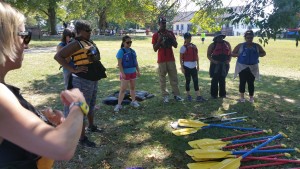 l practice that grew out of last years team, and something that members enjoyed and learned to practice as a life skill that could be applied to other areas of their work.
l practice that grew out of last years team, and something that members enjoyed and learned to practice as a life skill that could be applied to other areas of their work.
Sometimes we get so enmeshed in our own problems, we lose sight of the wider possibilities that a discerning listener can help us tease out. The process is not meant to be about giving advice, or replace therapy. Rather the process is meant to help a person listen to more deeply to what they are intending underneath what they are saying. The one critical axiom for group coaching is, except in exceptions, never to to ask Why. Why? Because Why is a question that invites people to get more into their head, rather then laying out the situation for others to observe. Why invites interpretation when what coaching asks for is observation.